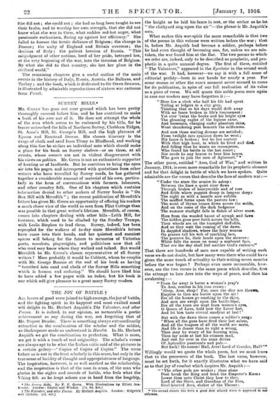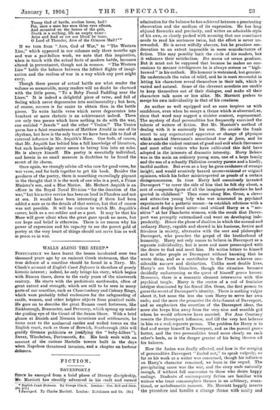THE JOY OF BATTLE.
ALL lovers of good verse joined to high courage, the joy of battle, and the fighting spirit in its happiest and most exalted mood will delight in Mr. Herbert Asquith's The Volunteer, and other Poems. It is indeed, in our opinion, as memorable a poetic achievement as any during the war, not forgetting that of Mr. Rupert Brooke. There is something always extraordinarily attractive in the combination of the scholar and the soldier, as Shakespeare made us understand in Hamlet. In Mr. Herbert Asquith we get the combination to perfection. What is more, we get it with a touch of real originality. The scholar's verses are always apt to be what the Italian critic said of the pictures in a certain gallery—" Copies of Copies of Copies." The verse before us is not in the least scholarly in this sense, but only in the true sense of lucidity of thought and appropriateness of language. The inspiration, however, is as well marked as the scholarship, and the inspiration is that of the man in arms, of the man who glories in the sights and sounds of battle, who feels what the Viking felt as he leapt ashore axe in band from the longship, • The surrey Mill.. By F. E. Green. With Illustrations by Elliott Sea- brook.. London : Chatto and Windus. [7s. 6d. net.] t The Volunteer, and other Peons. By Herbert Asquith. London : Sidgwlek and Jackson. Its. net.] the knight as he laid his lance in rest, or the archer as he let " the clothyard sing upon the air "—the phrase is Mr. Asquith's Own.
What makes this war-spirit the more remarkable is that two of the poems in this volume were written before the war ; that is, before Mr. Asquith had become a soldier, perhaps before he had even thought of becoming one, for, unless we are mis- taken, the war found him at the Bar. The two poems to which we refer are, indeed, only to be described as prophetic, and pro- phetic in a quite unusual degree. The first of these, entitled " The Volunteer," appeared in the Spectator in the second week of the war. It had, however—we say it with a full sense of editorial perfidy—been in our hands for nearly a year. For some reason or other the exact moment never seemed to come for its publication, in spite of our full realization of its value as a piece of verse. We will quote this noble poem once again in case our readers may have forgotten it :— " Here lies a clerk who half his life had spent Toiling at ledgers in a city grey. Thinking that so his days would drift away With no lance broken in life's tournament : Yet ever 'twizt the books and his bright eyes The gleaming eagles of the legions came, And horsemen, charging under phantom skied. Went thundering past beneath the oriftamme.
And now those waiting dreams are satisfied ; From twilight into spacious dawn he went ; His lance is broken ; but ho lies content With that high hour, in which he lived and died. And falling thus he wants no recompense, Who found his battle in the last resort ; Nor needs he any hearse to bear him hence, Who goes to join the men of Agincourt." • The other poem, entitled " Ares, God of War," and written In January, 1914, is even more remarkable for its prophetic element and for that delight in battle of which we have spoken. Quite admirable are the verses that describe the face of modern war Under the stars the armies lie asleep : Between the lines a quiet river flows Through brakes of honeysuckle and of rose And fields where poppies droop in languor deep The night as with a mantle now enfolds The muffled forms upon the pasture low ; The scent of thyme comes down across the wolds, And on the roses of the dark hedgerow The summer starlight falls in flakes of silver snow.
Here from the wooded haunt of nymph and fawn The hidden guns peer forth across the hills, Their wheels are on the trampled daffodils, And so they wait the coming of the dawn. In dappled shadows, where the fairy weaves On grasses tall his web of sparkling lace, The gunners lie, their heads upon the sheaves : White falls the moon on many a sunburnt face, That ere the day shall feel another God's embrace."
That there are hundreds of men now capable of writing such verse we do not doubt, but how many were there who could have' given the same touch of actuality to their writing seven menthe before the war began ? Perhaps even more memorable, how- ever, are the two verses in the same poem which describe, first the attempt to lure Ares into the ways of peace, and then his awakening :- "From far away is borne a woman's pray'r To Ares, restless in his iron crown : `Sleep, Ares, sleep ! For, once the dice are thrown, Empires to thee are leaves upon the air ! Ere all the homes go smoking to the skies, And men are swept upon the battle-blast, Ere all the tears are wept from women's eyes, 0 Queen of Love, hold now thy Lover fast, And let him taste eternal anodyne at last !'
But with the dawn there comes a soldier's song I ' When all the guns have fired their last salute, And all the tongues of all the world are mute, And life is dearer than to right a wrong, Then may he weary of his burning wine, Then lay aside at last his crimson mail, And rest for ever in the arms divine
Of Aphrodite passionate and pale—
But hark! He comes Hail, Ares ! Lord of thunder, Hail !'" Willingly would we quote the whole poem, but we must leave that to the possessors of the book. The last verse, however, must be set forth, for it exactly illustrates what we have said as to that joy of combat which inspires Mr. Asquith :- "' The other gods are weaker ; thou alone Post break the King and bend the Emperor's Knee Lower than unto Christ they bow to thee, Lord of the Slave, and Guardian of the Free, Steel-hearted Ares, shaker of the Throne ;
• The second stanza has been a good deal altered sines it appeared In sue cattalos.
Young God of battle, restless lover, hail 1 For, once a man has seen thine eyes aflame,
And mounted on the horses of the gale,
Death is a nothing, life an empty name :
Arise and lead us ere our blood be tame,
0 Lord of Thunder, Ares of the Crimson Mail !' "
If we turn from " Ares, God of War," to " The Western Line," which appeared in our columns only three months ago and was a post-bellum work, we note that this inspiration, when in touch with the actual facts of modern battle, becomes
altered in presentment, though not in essence. " The Western Line" holds the balance between the loftiest flights of imagi- nation and the realism of war in a way which any poet might envy.
Though these poems of actual battle are what render the volume so memorable, many readers will no doubt be charmed with the little poem, " To a Baby Found Paddling near the Lines." It is indeed a delightful piece of verse, and full of feeling which never degenerates into sentimentality ; but here, of course, success is far easier to obtain than in the battle pieces. To write battle verse which never degenerates into bombast or mere rhetoric is an achievement indeed. There are only two poems which have nothing to do with the war, one entitled " Jewels " and the other " Venice." The Venice poem has a faint remembrance of Matthew Arnold in one of its rhythms, but here is the only trace we have been able to find of external influence in Mr. Asquith's Muse. One feels, of course,
that Mr. Asquith has behind him a full knowledge of literature, but such knowledge never seems to betray him into an echo. He is always himself. His poetry is essentially individual,
and herein in no small measure is doubtless to be found the secret of its charm.
Once again, we strongly advise all who care for good verse, for war verse, and for both together to get his book. Besides the goodness of the poetry, there is something exceedingly piquant in the thought that it is the work of one who is a poet, a Prime Minister's son, and a Blue Marine. Mr. Herbert Asquith is an officer in the Royal Naval Division " for the duration of the war," but his active service has been on land in Flanders and not at sea. It would have been interesting if there had been added a note as to the details of that service, but that of course was not possible. It will be curious to watch Mr. Asquith's career, both as a sea-soldier and as a poet. It may be that his Muse will grow silent when the great guns speak no more, but our hope and belief is otherwise. There is no reason why his power of expression and his capacity to see the purest gold of poetry at the very heart of things should not serve him as well in peace as in war.











































 Previous page
Previous page